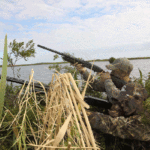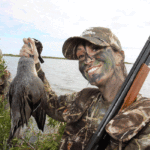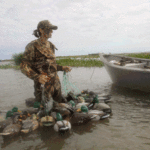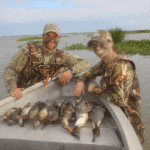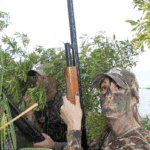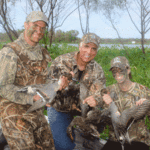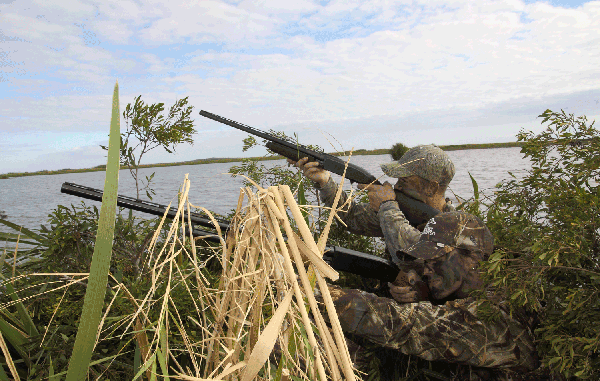
This brother-sister team grew up in competitive sports, and their duck-hunting forays to the Atchafalaya Delta Wildlife Management Area are no different. Here’s how they find success.
A midmorning hunt with a late arrival on the Atchafalaya Wax Delta was the plan. Adam Rhodes had no desire to get up at 3 a.m. to beat the weekend crowd to some of the better locations he already scouted and plugged into his GPS.
The diehard Morgan City waterfowl hunter had done the middle-of-the night thing before in order to beat others to a preferred location.
And he figured out it isn’t always necessary.
Rhodes is now accustomed to making later-in-the-day hunts on the Atchafalaya Delta Wildlife Management Area, understanding the tidal conditions and advantages of scouting prior to hunting the vast 141,000-acre refuge that can only be reached by boat.
Where he is concerned, it isn’t always important getting the early birds, but being the smart hunter who gets birds consistently — period.
His sister Amanda, whom he introduced to waterfowl hunting, knows this to be a fact.
A few years older than her brother, the 24-year-old who teaches first grade at Raintree Elementary in Baldwin, admittedly prefers to hunt ducks with him because he’s successful when others aren’t. The year prior she killed her first mallard on a Delta hunt her baby brother took her on.
The schoolteacher goes as far to say it’s sometimes harder for her to go duck hunting with others, including her boyfriend, as a result.
The two siblings agree they grew up in a close family whose parents supported them in everything, particularly competitive sports. Amanda played volleyball and softball, while Adam played baseball and football.
But, growing up in a close family wasn’t without a fracas now and again.
“When we were little I was the boss,” said the older Rhodes, laughing about their childhood years. “We’d go to fist fighting sometimes, but me being boss only lasted until he got big — and then it was over.”
Knowing it’s first come, first serve and no one can claim a spot for his own on the Delta, Adam Rhodes also had a plan to fall back on, saying you almost have to when hunting the refuge. If someone else were in the spots he scouted for us or there was no water when we arrived, his cousins Jay and Corey Rhodes would be the backup plan, holding their blind for us to take over after their hunt.
“Jay is someone who scouts and scouts and scouts,” Adam Rhodes bragged. “When everyone is at the camp eating and taking an afternoon nap, he’s out there in a boat running around finding out where the ducks are. He’s another guy who kills his share of ducks, and he’s only 18.
“But scouting is really important if you want to kill ducks on the Delta.”
As it turned out, all of Rhodes’ spots had little water or were occupied. Contacting his cousins by cell phone, according to the backup plan, he learned they had just finished up and their blind was ours.
Meeting us on the bank, his cousin gave us a rundown.
“There are still some birds flying,” he said. “We’ll leave the decoys and robos out for you guys; just pick them up when you’re done and drop them off at the camp on your way out.”
We thanked them for the favor. They had a great morning running up the score against the ducks on the Wax Delta, limiting out. Our mid-morning hunt was like the second string coming in to mop up the game.
Settled in, it wasn’t long before Rhodes’ sister, calling him by the nickname for his ability to sleep anywhere at anytime said, “Sleep! Straight ahead — flying low — what are they?”
“Pintails, Amanda — get down — don’t look at them — get your gun ready — try and blend in with the back of the blind,” he said, being almost paternal with his sibling.
“You see that, Mr. John,” she whispered, with a smile holding back a laugh and paying only slight attention to her brother’s direct. “He ain’t telling you all that.”
As humorous as the sibling exchange was for me, her brother’s tactics on the Delta were proven. She knew few who go hunting with him and fail to come home without birds, and all want to go back.
Text messaging her boyfriend, who hunts out of a boat with a popup blind, she learned he and his partners weren’t fairing very well. True to form, her brother was about to put her in ducks — pintails, at that.
She so wanted to score her first pintail, and they looked to be cooperating. Suddenly, her smile turned serious with concentration.
“Don’t get me wrong; I’d like to have one of those Pro-Drives or Gator-Tails,” said Rhodes, who followed his sister’s lead and is studying at Nichol’s State University to become a schoolteacher. “But, on a teacher’s salary I don’t think it’ll be anytime soon.
“If I did have one, I think I’d use it more to get me close to the ponds I want to hunt on the Delta because I find that the birds get used to seeing those things and start to avoid them after a while.”
Concealment is the issue.
“You can’t fully cover them up, and they stick out like something not natural,” he explained. “Anyway, I prefer to walk in and get in the cut grass, where it’s more natural and high enough to cover you from birds passing directly overhead.
“I find that I’m just as or more successful than those who use them.”
The pintails, skittish from shooting off in the distance, wanted to commit. But, just when they’d cup their wings, a shot would go off in the distance, and we’d watch them flare and increase altitude.
Finally, with Rhodes’ instructions to keep down with our faces buried adhered to, the birds came in close.
Firing, then racking her Mossberg 20-gauge pump, Amanda was on the mark and pintails lay on the water. Her first.
“I wanted a pintail so bad,” she said with excitement, while her brother made the retrieve beyond the decoys. “I got my first mallard last year, and I really wanted to get a pintail. I also want to get a redhead and canvasback, too. I just think they’re all really, really beautiful.”
The schoolteacher told how she has taken feathers to the classroom to introduce her students to outdoor activities, biology and science. Moreover, many of them think she is pretty cool, because she hunts — particularly the older boys in grades above the one she teaches.
She also enjoys shooting all kinds of guns, and owns a Glock 23 .40-caliber, a Taurus .38 Special and Mossberg bolt-action .30-06 in addition to her pump shotgun.
“I love to shoot, and I’m working on getting my concealed weapons permit,” Amanda Rhodes said. “I think women should be familiar with firearms, and I personally refuse to be a victim if I can prevent it. But also, for some reason shooting relaxes me; it’s sort of a release I guess. I’ve even shot my dad’s Smith and Wesson .500.
“In short, if it fires I’ll shoot it. My boyfriend is a police officer, and he and I shoot a lot together. We even went out and practiced shooting clay pigeons getting ready for the duck season.”
That confidence in her firearms and some youthful exuberance caused her to jump up too soon and fire, missing a duck committed to the decoys.
That solicited another round of sibling rebuke from her brother.
“You gotta let them get closer Amanda,” Rhodes said emphatically. “Let them land in the decoys if you got to when they commit.”
Never without a smile, taking it all in stride, she laughingly replied.
“I just get excited, Sleep,” she retorted. “I know — I know — I know, I gotta let them get closer.”
The later in the season it gets, and as the cold temperatures and frost begins to kill the greener vegetation on the Delta, Rhodes’ two main tactics remain the same.
He scouts hard and looks for where the ducks are, preferably in locations that hold enough water, as when the winter north winds tend to push water out and leave mudflats.
And he looks for natural cover like cut grass.
However, when natural vegetation is sparse, he supplements by bringing some of his own.
“When most of the vegetation is gone, I still try to find places where there still is some cut grass,” he said. “But I’ll bring cover out there like myrtles, and place it in front of me and let the cut grass break up my silhouette and provide some back cover.
“I’ll also bring some artificial camouflage to supplement that, if necessary. But to be successful you’ve got to cover up.”
He said his preference is to stay away from open water.
“I don’t like really open places,” he said. “I find the birds avoid a little spot of grass in a big open pond area with decoys around it.”
Rhodes also believes in face camouflage if you’re not wearing a mask. Face painting has become the hallmark that he’s known for. He’s serious about the little details, and he doesn’t want a white face to spook cautious ducks.
For Amanda, painting her face with camouflage was no more difficult than applying make up. And, though not a tomboy, Rhodes’ sister loves anything outdoors. But, still finds time to be feminine she says.
“My dad took me hunting when I was young and I’ve killed squirrel, so I’m not a girly-girl,” Amanda said. “We did a lot of things outdoors growing up, and I like anything outdoors. I like to teach my students about the outdoors. But, don’t get me wrong: I like shopping and all that, too — letting that feminine side of being a girl come out.”
Both Rhodeses admitted that, now that they are older, some of the sibling rivalry has waned. In fact, they get along much better since Amanda moved out of the house and has been on her own a while.
But don’t be surprised if one day you find Rhodes’ big sister on the Wax Delta guiding a few guys and teaching them a thing or two on the finer points of public duck hunting.
She’s a quick study, and is used to being boss — just ask her 21 students she fondly refers to as her ducklings, following her wherever she goes.
